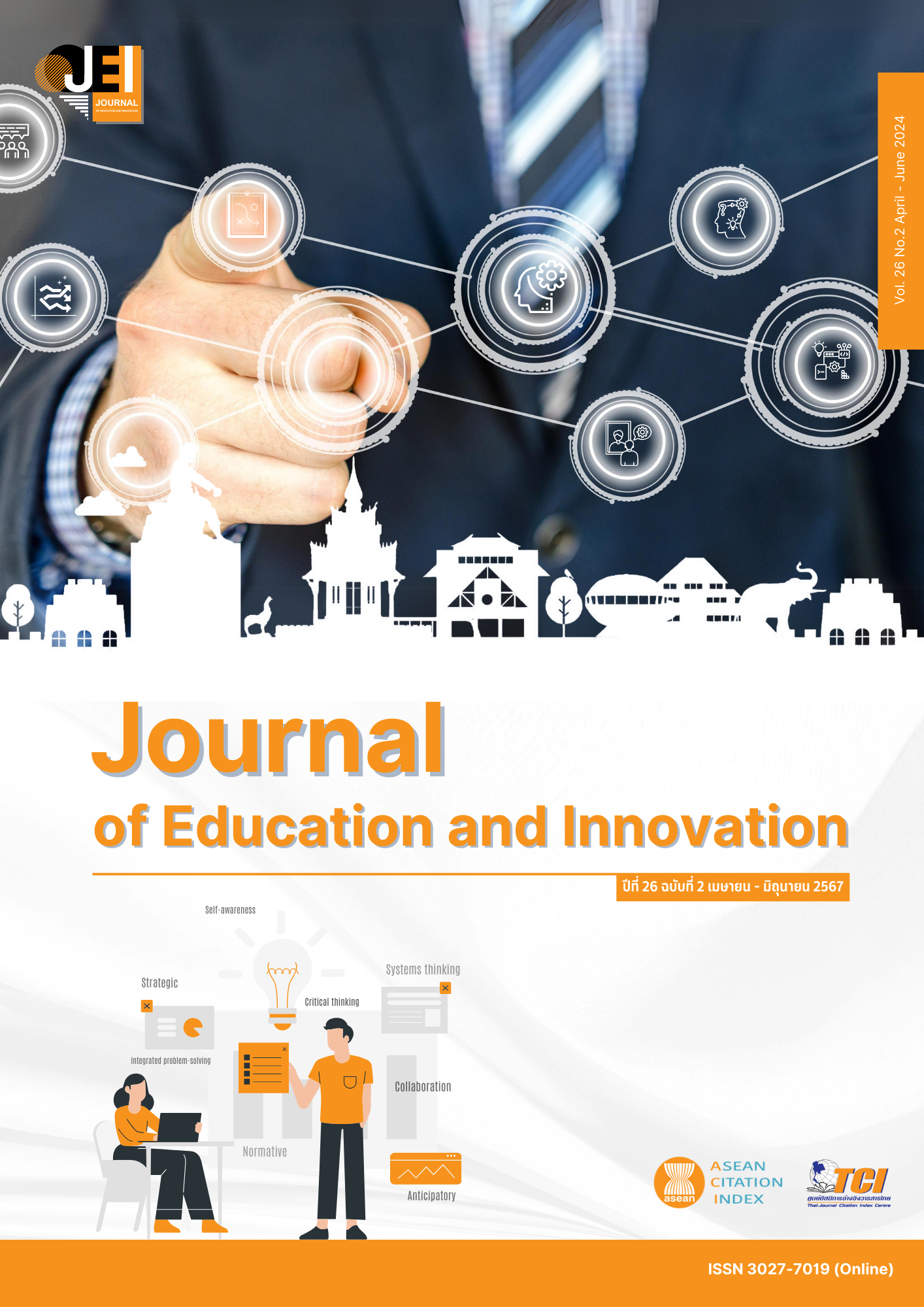STUDENTS' ACADEMIC RISK TAKING AND NEEDS FOR ACADEMIC MANAGEMENT AT AN INTERNATIONAL SCHOOL IN BANGKOK
Main Article Content
Abstract
Academic risk taking (ART) is a crucial behavior that promotes academic success and innovative skills. It is also defined as one of the 21st-century skills that students should have; therefore, schools must focus on developing ART behavior in the students through academic management. This research aimed to 1) determine the current secondary school students' ART level at Bromsgrove International School and 2) identify the needs for academic management development based on the concept of ART at Bromsgrove International School. Data was collected from 36 secondary teachers, eight management staff, and 90 mixed nationality students in Year 7 and 10 aged 11-16 using an online survey and was analyzed by frequency, percentage, average, standard deviation, and PNImodified.
The result revealed that 1) the overall current level of students' ART in Year 7 and 10 was moderate, while Year 10 students' level of ART was slightly lower than Year 7 in all elements of ART. The highest ART component in students was Response to failure action (RFA) in Year 7 and 10 students. And 2) the overall current and desirable state were at a moderate and high level, respectively, with the highest need in the assessment and evaluation dimension, followed by curriculum development and teaching and learning. Affect had the highest need in overall academic management, especially in curriculum development and teaching and learning dimension, while Preferred Difficulty (PD) had the highest need in the assessment and evaluation dimension.
Article Details

This work is licensed under a Creative Commons Attribution-NonCommercial-NoDerivatives 4.0 International License.
The owner of the article does not copy or violate any of its copyright. If any copyright infringement occurs or prosecution, in any case, the Editorial Board is not involved in all the rights to the owner of the article to be performed.
References
Abercrombie, S., Carbonneau, K. J., & Hushman, C. J. (2022). (Re) Examining academic risk taking: Conceptual structure, antecedents, and relationship to productive failure. Contemporary Educational Psychology, 68, 102029.
Beghetto, R. A. (2009). Correlates of intellectual risk taking in elementary school science. Journal of Research in Science Teaching: The Official Journal of the National Association for Research in Science Teaching, 46(2), 210-223.
Buathong, S. (2017). Assessment and evaluation 21st century learning skills. Veridian Electronic Journal , Silpakorn University, 10(2), 1856-1867.
Cetin, B., Ilhan, M., & Yilmaz, F. (2014). An investigation of the relationship between the fear of receiving negative criticism and of taking academic risk through canonical correlation analysis. Educational Sciences: Theory and Practice, 14(1), 146-158.
Clark, S., & Soutter, M. (2022). Growth mindset & intellectual risk-taking: Disentangling conflated concepts. Phi Delta Kappan, 104(1), 50-55.
Clifford, M. M. (1991). Risk taking: Theoretical, empirical, and educational considerations. Educational Psychologist, 26(3-4), 263-297.
Clifford, M. M., & Chou, F. C. (1991). Effects of payoff and task context on academic risk taking. Journal of Educational Psychology, 83(4), 499.
Cornwall, S. (2018). Failing safely: Increasing theology and religious studies students’ resilience and academic confidence via risk-taking in formative assessment. Teaching Theology & Religion, 21(2), 110-119.
Deveci, İ., & Aydin, F. (2018). Relationship between students' tendencies toward academic risk-taking and their attitudes to science. Issues in Educational Research, 28(3), 560-577.
Dweck, C. S. (2006). Mindset: The New Psychology of Success. New York: Random House Publishing Group.
Khantisampanno, P. N., & Kositpimanvach, E. (2023). Curriculum evaluation. Journal of Modern Learning Development, 8(3), 388-401.
Miller-Slough, R. L., & Dunsmore, J. C. (2016). Parent and friend emotion socialization in adolescence: Associations with psychological adjustment. Adolescent Research Review, 1, 287-305.
Minstrell, J., & Kraus, P. (2005). Guided inquiry in the science classroom. How students learn: History, mathematics, and science in the classroom, 475-513.
Siong, E. T. W. (2017). The influence of global-local processing styles on academic risk taking (Master thesis). Singapore: National University of Singapore.
Smith, S., & Henriksen, D. (2016). Fail again, fail better: Embracing failure as a paradigm for creative learning in the arts. Art Education, 69(2), 6-11.
Tay, B., Özkan, D., & Tay, B. A. (2009). The effect of academic risk taking levels on the problem solving ability of gifted students. Procedia-Social and Behavioral Sciences, 1(1), 1099-1104.
Young, R. D. (1991). Risk-Taking in Learning, K-3. NEA Early Childhood Education Series. ERIC.


